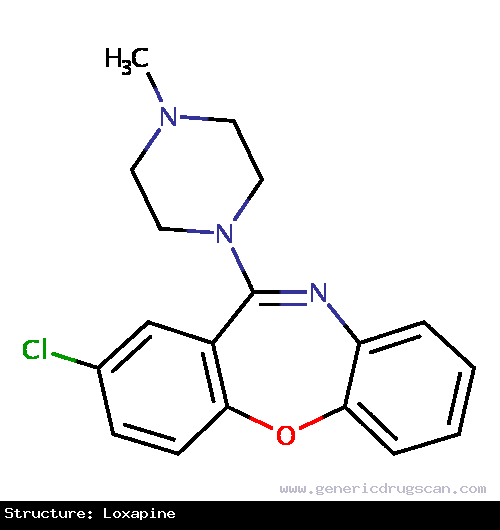Loxapine Drug: Indication, Dosage, Precaution, Side Effect , Storage, Category Type and corresponding Brands - www.genericdrugscan.com
Loxapine
Drug Status in USA : ApprovedDrug Status in Canada : Approved
pronunciation
pronounced as (lox' a peen)
Why is this medication prescribed?
Loxapine is used to treat the symptoms of schizophrenia (a mental illness that causes disturbed or unusual thinking, loss of interest in life, and strong or inappropriate emotions). Loxapine is in a group of medications called conventional antipsychotics. It works by decreasing abnormal excitement in the brain.
How should this medicine be used?
Loxapine comes as a capsule to take by mouth. It is usually taken two to four times a day. Try to take loxapine at around the same times every day. Follow the directions on your prescription label carefully, and ask your doctor or pharmacist to explain any part you do not understand. Take loxapine exactly as directed. Do not take more or less of it or take it more often than prescribed by your doctor.
Your doctor will probably start you on a low dose of loxapine and increase your dose during the first 7 to 10 days of your treatment until your symptoms are controlled. Once your symptoms have been controlled for some time, your doctor may decrease your dose. Be sure to tell your doctor how you are feeling during your treatment with loxapine.
Loxapine may control your symptoms but will not cure your condition. It may take several weeks or longer for you to feel the full benefit of loxapine. Continue to take loxapine even if you feel well. Do not stop taking loxapine without talking to your doctor.
What are the precautions to be followed?
Before taking loxapine,- tell your doctor and pharmacist if you are allergic to loxapine or any other medications.
- tell your doctor and pharmacist what prescription and nonprescription medications, vitamins, nutritional supplements, and herbal products you are taking or plan to take. Be sure to mention any of the following: antidepressants; antihistamines; atropine (in Motofen, in Lomotil, in Lonox); barbiturates such as pentobarbital (Nembutal), phenobarbital (Luminal), and secobarbital (Seconal); epinephrine (Epipen); ipratropium (Atrovent); lorazepam (Ativan); medications for anxiety, irritable bowel disease, mental illness, motion sickness, Parkinson's disease, seizures, ulcers, or urinary problems; narcotic medications for pain; sedatives; sleeping pills; and tranquilizers. Your doctor may need to change the doses of your medications or monitor you carefully for side effects.
- tell your doctor if you have or have ever had seizures, difficulty urinating, glaucoma (condition in which increased pressure in the eye can lead to gradual loss of vision), breast cancer, or heart disease. Also tell your doctor if you have ever had to stop taking any medication for mental illness due to severe side effects.
- tell your doctor if you are pregnant, especially if you are in the last few months of your pregnancy, or if you plan to become pregnant or are breast-feeding. If you become pregnant while taking loxapine, call your doctor. Loxapine may cause problems in newborns following delivery if it is taken during the last months of pregnancy.
- if you are having surgery, including dental surgery, tell the doctor or dentist that you are taking loxapine.
- you should know that this medication may make you drowsy and may affect your thinking and movements. Do not drive a car or operate machinery until you know how this medication affects you.
- ask your doctor about the safe use of alcohol during your treatment with loxapine. Alcohol can make the side effects of loxapine worse.
- you should know that loxapine may cause dizziness, fainting, and lightheadedness, especially when you get up from a lying position. To avoid this problem, get out of bed slowly, resting your feet on the floor for a few minutes before standing up.
What are possible side effects of this medication ?
Loxapine may cause side effects. Tell your doctor if any of these symptoms are severe or do not go away:- drowsiness
- dizziness
- faintness
- weakness
- difficulty falling asleep or staying asleep
- blurred vision
- dry mouth
- increased saliva
- nausea
- vomiting
- constipation
- difficulty urinating
- excessive thirst
- weight gain or loss
- agitation
- slurred speech
- headache
- rash
- itching
- hair loss
- flushing
- drooping eyelids
- puffing of the face
- blank facial expression
- shuffling walk
- unusual, slowed, or uncontrollable movements of any part of the body
- restlessness
- numbness, burning, or tingling of the hands or feet
- breast milk production
- breast enlargement
- missed menstrual periods
- decreased sexual ability in men
- fever
- muscle stiffness
- confusion
- fast or irregular heartbeat
- sweating
- neck cramps
- tightness in the throat
- difficulty breathing or swallowing
- tongue that sticks out of the mouth
- fine, worm-like tongue movements
- uncontrollable, rhythmic face, mouth, or jaw movements
- seizures
- decreased vision, especially in low light
Loxapine may cause other side effects. Tell your doctor if you have any unusual problems while you are taking this medication.
How to store the medication and dispose it of after its use later?
Keep this medication in the container it came in, tightly closed, and out of reach of children. Store it at room temperature and away from excess heat and moisture (not in the bathroom). Throw away any medication that is outdated or no longer needed. Talk to your pharmacist about the proper disposal of your medication.
Drug Category/Class
- Dopamine Antagonists
- Diazepines, Oxazepines, Thiazepines and Oxepines
- Antipsychotic Agents
- Nervous System
- Psycholeptics
- Diazepines, oxazepines, thiazepines and oxepines
| Prescribed | For the management of the manifestations of psychotic disorders such as schizophrenia |
| Weight : | 327.808 |
| Structure | Loxapine |
 | |
| Formula | C18H18ClN3O |
Loxapine has 16 Brands listed
Search Generic Drugs alphabetically
